
| WWT Shows | CLICK TO: Join and Support Internet Horology Club 185™ | IHC185™ Forums |

|
• Check Out Our... • • TWO Book Offer! • |
Welcome Aboard IHC185™  Internet Horology Club 185
Internet Horology Club 185  IHC185™ Discussion Site Main Page
IHC185™ Discussion Site Main Page  Horological Discussions, Questions and Answers
Horological Discussions, Questions and Answers  European Pocket Watch Forum
European Pocket Watch Forum  Verge/fusee lovers step forward!
Verge/fusee lovers step forward!
 Internet Horology Club 185
Internet Horology Club 185  IHC185™ Discussion Site Main Page
IHC185™ Discussion Site Main Page  Horological Discussions, Questions and Answers
Horological Discussions, Questions and Answers  European Pocket Watch Forum
European Pocket Watch Forum  Verge/fusee lovers step forward!
Verge/fusee lovers step forward!Go  | New Topic  | Find-Or-Search  | Notify  | Tools  | Reply to Post  |  |
Dave both are great.I really like the cock on the Nesbitt. What do you (all) look for/at when thinking about buying a fusee or verge? I date them by the foot,pillars,dial,hands and hallmarks to start.These should all be from about the same era If I am interested in a movement after it passes my first quick look I generally start with "does it run?" as repairs seem to start at 2oo.oo and go up from there. Then I start really looking at it... | ||||
|
Stephanie..I have not forgotten you..info is soon to follow. I promised Stephanie(on CAT) I would descried the difference between fusee and a Verge...i will this weekend unless someone else would like to step to bat..(please do) more explanations are better then one. She mentioned she was interested to some degree in acquiring one,but wanted to know what to look for(like any intelligent watch collector would. A ladies question needs answered!I hope we will come through for her. Stephanie...by Sunday night OK? Sorry for the delay...crazy busy. | ||||
|
I'll take a crack at the explanation -- Very briefly, a fusee is a device to compensate for the decreasing strength of a mainspring as it unwinds. The mainspring transmits power to the fusee by a chain or cord (usually gut). The fusee is usually mounted on the first wheel in the gear train, next to the center wheel. Fusees are found in many old pocketwatches (19th century and earlier) and most chronometers. Watches or clocks with fusees may have a wide variety of escapements. A verge is an early type of escapement, used in clocks and watches. In watches it is almost always paired with a fusee because a verge escapement is sensitive to the power transmitted through the gear train. All of the watches pictured above have a fusee mechanism, and so are commonly called fusee watches. You can see the cone of the fusee with its spiral track in some of the side views. Most of the watches shown also happen to have verge escapements (except for my first example and the Bolton). | ||||
|
Did Ya'll See This One ?? I'm just a novice RR PW guy - what do you "Verge/fusee" folks think ?? - description detailed enough ?? | ||||
|
He seems to really like it....perhaps he should not be selling it if he love's it that much It is a nice watch...Issac Rogers did alot of Turkish market stuff I beleive..."pieces of time" have a couple of nicer examples. Good eye Jim! | ||||
|
I think you're right on target, Stephen, as it would appear that no one else loved it as much as he did - since it didn't make Reserve . . . either that - or - others, after reading that massive missive for a description and looking at all those photos, were just too exhausted to bid . . . Timely regards, | ||||
|
Here is another nice little fusee.The Spelling style on the regulator made me think Georgii III. Regis. but the hallmarks are later. The case is 18k 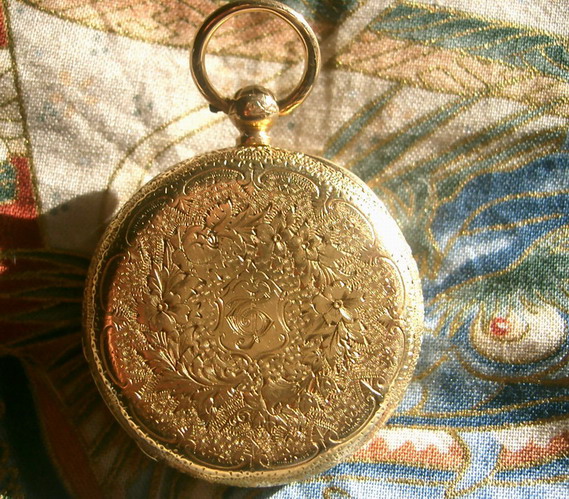 | ||||
|
here are the hallmarks. 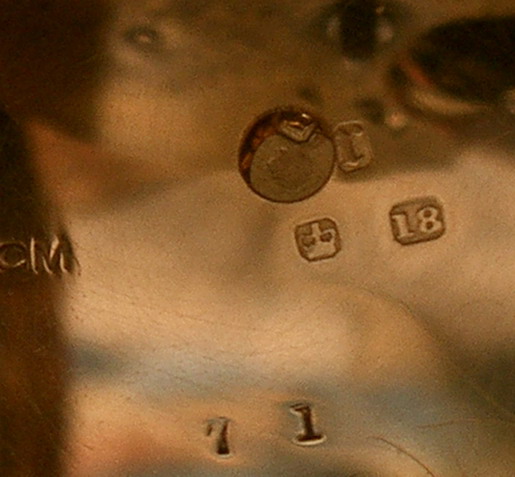 | ||||
|
And the dial..with the case closed 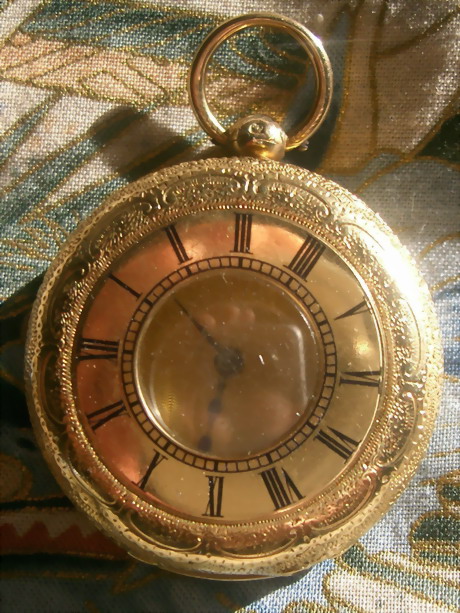 | ||||
|
one more...This is one of two lovely watches that I purchased from Phil D. Its running strong Phil 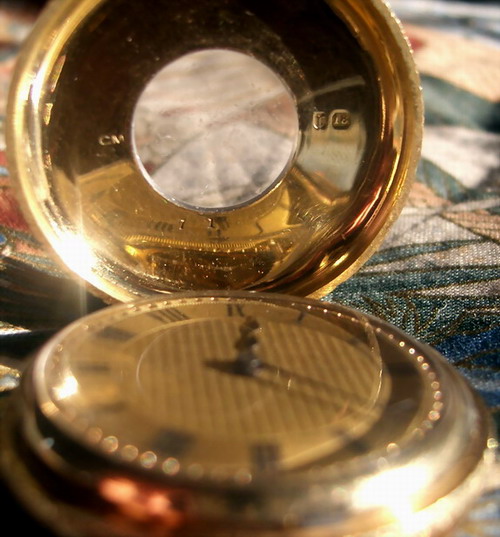 | ||||
|
Jim, Another reason the watch might not have made reserve is, they only have 5 feedbacks. I wouldn't pony up that kind of money with only 5 feedbacks. Brian C. | ||||
|
great examples so far...Glad to see some collectors out there. | ||||
|
| IHC President Life Member |
Very cool. We've found a lot of "cross-over" interest. It could happen in these as well. Keep 'em comin' guys! | |||
|
I will try to post some pics, I only wish they were as good asthe ones shown.  | ||||
|
Eardly Norton was active in London from 1762 to 1794, according to Baillie's Watchmakers & Clockmakers of the World. 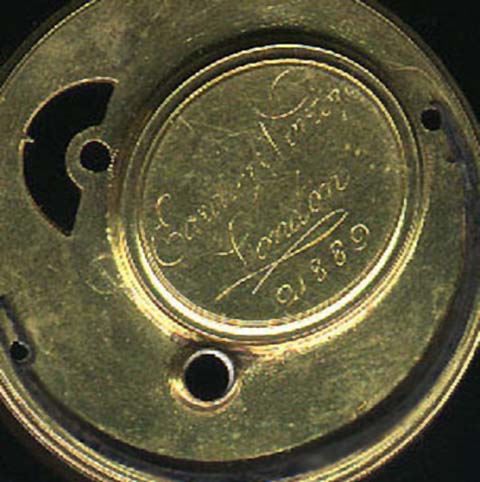 | ||||
|
#3 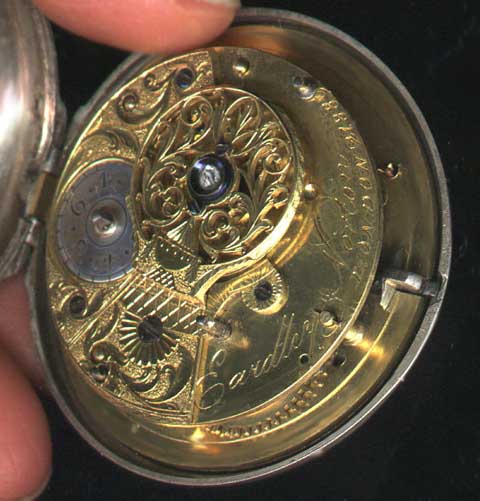 | ||||
|
Charles, Great dial painting and very complete watch!Could we see the case hallmarks? | ||||
|
Hi Stephen, the only thing in the way of a hallmark I can see on this old verge-fuzee is the mark on the pendent, and it is not clear to me what it is. Here is a close up. 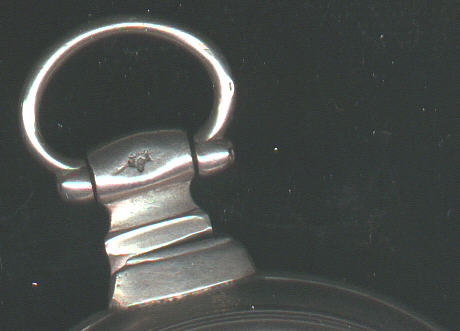 | ||||
|
Hi Charles.. No Case marks? Looks 1790'sto 1830's. | ||||
|
Here is a Benson. If you collect English watches you should have one of these...Anyone have a moon phase example? 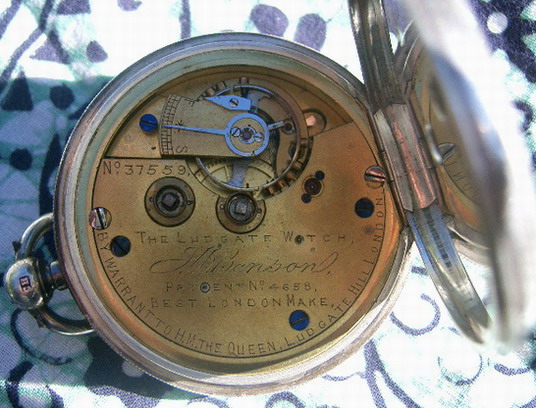 | ||||
|
Anyone picked up any verges lately? | ||||
|
Hi, Here's one which I consider to be an interesting verge fusee, by an unknown maker. The only clues to the maker ID are the letters, J.L.ST.W 2555 which is stamped on the movement dial plate. There are several different features on this mvt which makes it highly unusual. The movement has an unusual key wind feature at the 23 minute mark, through the side of the fluted bezel. Once the front bezel of the consular case is opened, the watch can be wound, set or adjusted from the front, without having to swing the mvt out. None of my usual watch contacts have ever seen this feature on a verge before.  The mvt plate is stamped J.L ST.W2555 under the wheel on the right (you can just see the JL) in the under dial pic.  Note the nicely made winding gear set up under dial at 23 min.(above 2 pics) Top plate.  Note that there is no regulator on the top plate. This is because the regulator is adjusted with a key via a square arbor through the dial side. See Avance - Retard on top sub dial. (unusual, but seen on two other watches) Note also that the contrate wheel potence, on the top plate, has its 'tail' anti clockwise. (very unusual) This is the only European verge I have seen with this feature. All others seen have the tail facing clockwise.   The beautifully handpainted calendar dial is the nicest I have ever seen.  Note: Avance - Retard, in top sub dial, regulator square arbor comes through centre of hands. This sub dial does show leap year indications, month, number of days in each month, plus A365 X 3 years and A366 X 1 leap year, together with F29 for extra day in leap year. However, this is not a perpetual calendar mechanisim. There is an arbor for a centre seconds hand, but the hand is missing. I would appreciate hearing from anybody who has ever seen a similar watch as my searching for the maker's identity has me stumped. A French museum advised me that my mvt was made by a master between 1750 - 1770, but had no name to suggest. My search has turned up many makers with JL initials, but this is the only one mentioned re centre seconds calendars within the time frame, but I cannot locate any pics of Lenoir watches. LENOIR J. J. Horloger genevois. Fin du XVIIIe, début du XIXe siècle. Montres avec calendrier, secondes au centre, cadrans décorés d'émail peint. LENOIR J J. Clock and watch maker genevois. End of 18th century (1750), beginning of the 19th century (1800). Watches with calendar, seconds in the center, dials decorated painted d'émail. Email: barry_parker@hotkey.net.au if you have any info please. Regards, Barry Parker | ||||
|
| Powered by Social Strata | Page 1 2 3 |
| Your request is being processed... |
|
©2002-2025 Internet Horology Club 185™ - Lindell V. Riddle President - All Rights Reserved Worldwide

